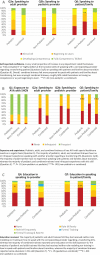Lost in transition: resident and fellow training and experience caring for young adults with chronic conditions in a large United States' academic medical center
- PMID: 31107191
- PMCID: PMC6534234
- DOI: 10.1080/10872981.2019.1605783
Lost in transition: resident and fellow training and experience caring for young adults with chronic conditions in a large United States' academic medical center
Abstract
Background: The transition from pediatric to adult healthcare is a vulnerable time for adolescents and young adults (AYA), especially those with chronic conditions. Successful transition requires communication and coordination amongst providers, patients, and families. Unfortunately, multiple studies have demonstrated that the majority of practicing providers do not feel prepared to help AYA patients through health care transition, but little is known about the transition/transfer aptitudes of physician trainees.
Objectives: The purpose of this study was to establish the transition/transfer training that residents and fellows from different fields receive - and determine what training factors are associated with increased confidence in core transition/transfer skills.
Design: A 20-item electronic survey regarding experiences caring for AYA patients was sent to all 2014-2015 graduate medical education (GME) trainees at our institution.
Results: Forty-nine percent (479/985) of trainees responded: 60 pediatric, 387 non-pediatric, and 32 'combined' (e.g., Medicine/Pediatrics or Family Medicine). Trainees from all three categories of programs reported similar exposure to AYA patients with chronic conditions, with a median of 1-3 encounters per month. A quarter of trainees rated themselves as 'not at all prepared' to speak with a counterpart provider about a transferring patient, while nearly half of trainees considered themselves 'not at all prepared' to speak with a patient and family about transition. Trainee confidence in performing these two skills was strongly predicted by three factors: increased exposure to AYA with chronic conditions, education (training or role modeling) in transition skills, and experience practicing transition skills. Of these, the strongest association with trainee confidence was experience practicing the skills of communicating with other providers (OR = 13.0) or with patients/families (OR = 14.5).
Conclusion: Despite at least monthly encounters with AYA with chronic conditions, most residents and fellows have very little experience communicating across the pediatric-to-adult healthcare divide, highlighting training opportunities in graduate medical education.
Keywords: Adolescents and young adults (AYA); graduate medical education; healthcare transition; transfer from pediatric to adult care; transition care skills; youth with special health care needs (YSHCN).
Figures


References
-
- Lotstein DS, McPherson M, Strickland B, et al. Transition planning for youth with special health care needs: results from the national survey of children with special health care needs. Pediatrics. 2005June;115(6):1562–7. - PubMed
-
- Blum RW, Garell D, Hodgman CH, et al. Transition from child-centered to adult health-care systems for adolescents with chronic conditions. A position paper of the society for adolescent medicine. J Adolesc Health. 1993;14:570–576. - PubMed
-
- Reiss JG, Gibson RW, Walker LR.. Health care transition: youth, family, and provider perspectives. Pediatrics. 2005;115:112–120. - PubMed
MeSH terms
Grants and funding
LinkOut - more resources
Full Text Sources
Medical
